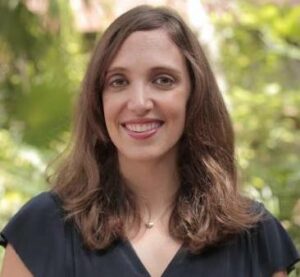Research Spotlight: Hannah Bayne
Q & A with Hannah Bayne, Ph.D., Assistant Professor in the School of Human Development and Organizational Studies in Education
What basic questions does your research seek to answer?
My research is concerned with the overarching question of human connection and understanding. How can we connect with one another in a way that generates genuine relationship, allows for expression and exploration of deepest pain, and facilitates healing? I am interested in exploring this question from a variety of angles — factors that enable connection, as well as factors that complicate or restrict relationship and understanding. For this reason, I am primarily interested in empathy as a skill that fosters deep understanding and connection. I also look at factors that can divide people, such as values conflicts and cultural dynamics, and explore how counselors can work within and beyond these conflicts to build rapport and expand their understanding of clients who may be very different from them.
What makes your work interesting?
We know that the quality of the therapeutic relationship is a primary determinant of successful treatment, above and beyond any particular approach. And yet, the specific components that contribute to relational strength are difficult to determine and evaluate. My particular focus is on empathy, which has been identified as a core factor in building a therapeutic relationship even though as a construct it is likewise difficult to operationalize and measure. I seek to better understand what empathy is, how it works to unite us, how it can be distinguished from other forms of intervention, and how we can intentionally and competently apply it to allow for deep therapeutic connection and growth. I see empathy as a tool for counselors to step out of their own limited worldview in order to explore the world of another. Therefore, I also see empathy as a tool to help counselors work through their own values conflicts and cultural blindspots. If a person can learn to acknowledge the limitations of the self, he or she can then approach every person from a place of curiosity and humility. I see this as a critical skill for counselors, but also an important socioemotional and perspective-taking skill that can be developed in children and other professionals alike.
What are you currently working on?
I am currently developing two assessments for empathy. One, the Empathic Counselor Response Scale, uses vignettes to test counselor ability to discriminate amongst levels of empathy. I am also working with colleagues to develop a virtual empathy assessment for children. Additionally, I am exploring methods for empathy training and development in counseling and medical education. Related to values conflicts, I am engaged in research exploring how religious counselors provide ethical and affirmative counseling to lesbian and gay clients. I am also working with a team to examine relational changes and relationship preservation strategies employed by people in politically divided relationships after the 2016 presidential election, which explores an understudied area of political identity in counseling. Finally, I am conducting research on how microaggressions and privilege manifest in counseling, and how counselors can address and integrate cultural differences in effective ways. Each of these studies approaches the issue of connection from a different lens, with the ultimate goal of describing how we can connect, honor, and facilitate healing in each other.






